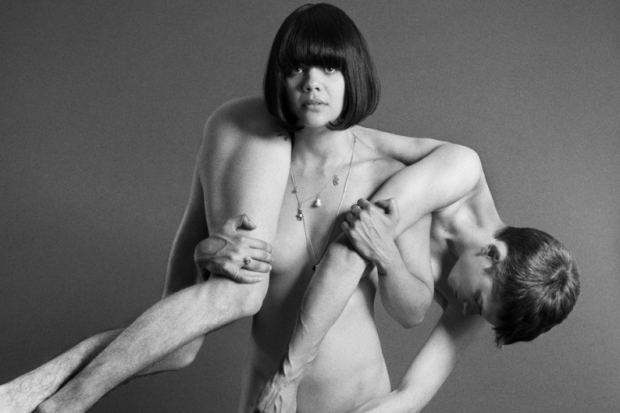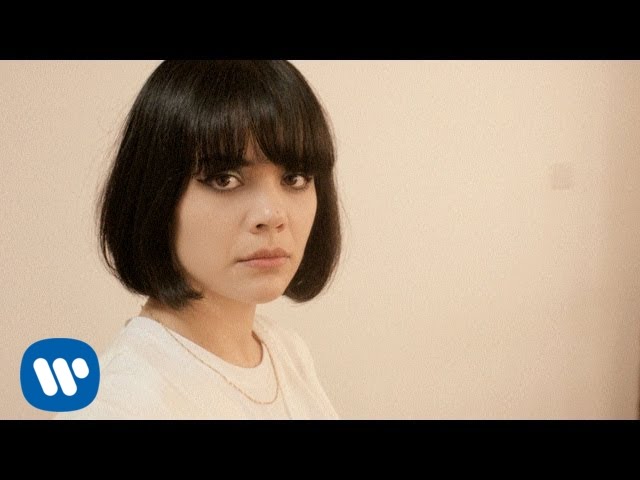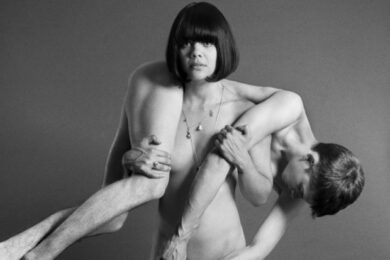"I worked my bloody arse off" is Natasha Khan’s florid self-assessment of her third album’s 30-month gestation period. The imminent release of The Haunted Man does feel like a landmark moment in the six-year history of Bat For Lashes. After her previous albums (the 2006 debut Fur And Gold and 2009’s superb Two Suns) were both Mercury-nominated and the luminous track ‘Daniel’ bagged her an Ivor Novello award, there is a bubbling sense of excitement surrounding Khan’s new material.
"The reaction to the new album feels very positive and there seems to be a momentum that’s happening, which feels partly scary and partly exciting," she tells me while tentatively sipping a cup of fruit tea.
We meet at her record label’s headquarters in Kensington. The glass-framed open-plan offices harbour a jukebox shaped like a rocket and giant cardboard cut-outs of the Gorillaz characters. Khan is perched upon a long sofa in a top-floor meeting room. She is open and friendly; I’m only her second interview of the session and it appears the first guy didn’t use up all of Natasha’s bonhomie towards journalists.
In making her new album, Khan has wheeled out the big guns. The Haunted Man features Beck, PJ Harvey-collaborator Rob Ellis and Adrian Utley from Portishead, while the ever-present David Kosten shares co-production duties with the omnipresent Dan Carey. The breathtaking lead single, ‘Laura’, was co-written with Justin Parker, best-known for penning Lana Del Rey’s ‘Video Games’. Predictably, Khan has used this myriad of talent to help deliver her finest set of songs to date. The Haunted Man is stripped back, focussed and personal, allowing the charged intensity of her songwriting to take centre stage.
And Natasha is a talker. I get long, rich monologues about the making of The Haunted Man, during which she reveals how the album feels "more English and upbeat" than her previous work. We chat about her years spent as a primary school teacher ("I’m naturally quite maternal so I think the children felt quite safe with me") and ponder why it is that squash isn’t an Olympic sport (Natasha’s father coached the legendary Jahangir Khan). Natasha seems happy and at ease – as if The Haunted Man has finally proffered her a sense of peace and acceptance.
What was your initial vision for The Haunted Man
Natasha Khan: Initially, I was preoccupied with how exhausted I was from the last tour. I came home after a very tumultuous break-up and moving all over the place. I was very unrooted and felt I’d lost myself a little bit. So, my main preoccupation was to feel sane again. After taking advice from close friends and people who love me, I decided to stay at home, make myself nice meals, go out for walks – I just sort of battened down the hatches.
I know that for Two Suns you travelled around America in search of inspiration. How did you get the spark for this album?
NK: I didn’t know what I was going to write about and it was that sitting and waiting that was hard. I watched loads of films and read loads of books. I went back to my old college and had discussions with my old art teacher about the themes I was interested in. I started to research ancestry, sacred spaces and religion in art. I was also interested in looking at the history of England and the history of my English family. Themes started to come through. I think that when you have been giving out for so long, you really need to spend a lot of time drinking things in again. The fertilisation process began to happen and I was very impatient, but gradually these tiny seedlings took root over the space of about a year. In the year-and-a-half after that I was writing and making the record.
How was the genealogy? Did you unearth any dark family secrets?
NK: I found it interesting and very telling – it was therapeutic. My family tree gave colour to how many people had been divorced, how many people never got married or how many people had three children. I saw how many people had mixed marriages or left the country. It was so interesting when you begin to look because you get loads of patterns happening. The generations were doing the same thing over and over again. I find that fascinating and very empowering because if you don’t want to repeat the same mistakes – to forge your own path and break the cycle – you need to be conscious of those things and why they happened and have compassion for them. That’s what this whole album is about. Letting go of the things that haunt me – the haunted men in my life – and releasing that baggage.
And hence the central theme for the title track?
NK: Yes. [The track] ‘The Haunted Man’ is a metaphor for how I feel men and women relate to each other in times of conflict. My granddad went away to war and when he came back he was given no therapy or help. It was only two generations ago, I can’t believe it. It’s still recent history for all of us that our grandparents went through a fucking hideous nightmare experience.
I agree. It’s extraordinary to think that my grandfather was provided virtually no support on returning from the frontline in the Second World War. He never spoke about what he’d seen.
NK: It’s horrific. It’s been hard in our English culture to strip things back and communicate really intimate feelings. I think that’s quite a new generational thing that in relationships we would talk to each other. It’s very different to what our grandparents were taught – stiff upper lip and all that. But I think there is a lot to be said for bloodlines and cell memory and things, like trauma, being passed down if it is not worked through.
In terms of how The Haunted Man is presented sonically, how did this quest for openness influence the album’s instrumentation?
NK: Early on, when I started writing these songs, I realised that the vocal was really prominent and I was stripping away loads of layers of reverb. Sonically, there was this desire to be much more intimate and much more upfront emotionally. I realised I wanted to strip away the layers in my life as well. I wanted to be at home and sit with how I was feeling and not be moving or running away or inviting in drama. It was an intense period.
The lead single, ‘Laura’, is stunning. I believe the song was a co-write with Justin Parker – what did you learn from the song-writing process?
NK: The actual process with Justin Parker only took two or three hours. We sat down together at a piano and he had the initial refrain and from there, I made some suggestions and he’d be like, ‘Can we bring in some more traditional chord structures?’ and ‘Should we do a middle eight?’ That’s what I wanted to learn – to take my more subversive ways of writing music and give me some structure and teach me something about traditional chord progression.
As with each of your previous albums, you co-produced much of The Haunted Man with David Kosten. What is it about David that works so well for you?
NK: I love to be involved in the production so we work together as engineers/producers. David is really good at getting down the basic performances of the song. I can then take them anywhere and do anything with them knowing they have the Bat For Lashes sound because we have a very similar love of recording techniques. I can just explain to him that I want a sound like ‘soldiers coming over a hill but through an old 50s radio’ and he’ll say ‘Yeah, we’ll get that sorted out’. He gives me massively free reign and he trusts me. He is a foil and we’ve become almost like one brain, really. He just lets me do what I want, which is great [laughs].
But then part of the album was recorded with Dan Carey. Why did you make the change?
NK: With Dan Carey, I’d said to David [Kosten] that we’d been married for many years and that I needed to go and have an affair. David and I had taken the album to a place where I felt it wasn’t moving forward because we know each other so well. There wasn’t anything to be challenged. That’s why I made an effort to go and play with Beck for a while and play with Rob Ellis and bring back some interesting and weird ideas. I took the second half of the album to Dan Carey and that was a whole new relationship. We had that kind of new-found childlike joy of trying to finish the record off and the album took a massive leap.
How was Beck as an ‘advisor’?
NK: He is very eccentric but actually very sweet, loving and down-to-earth. He is extremely calm and easy going. I took him ten very early demos that were all quite dancey and I think only two of them survived onto the record, which have performances from him on them. But the real thing I was doing when I was out there was being very free, creatively. Beck was up for trying everything – sticking anything on a song and not being judgmental but being very supportive. As an artist, you need those types of people early on, if you are not in a band. As a solo artist I felt I very much needed some mirrors and sounding boards.
That seems to be the plight of the solo artist – you have no one else but yourself.
NK: Totally – it’s never not about you. I was driving myself mad. I’d been to see Beck and was like, ‘It’s not right and I have to rewrite everything’ and freaking out. I wrote loads more and Rob came round. We had a cup of tea and I was in my pyjamas, which I’d been in for days on end, and he was like, ‘Bloody hell Natasha, you need a holiday. Let’s go to Italy and bring along some amazing musicians that can inspire you.’ We went to Perugia and recorded in some amazing old churches. We projected the male choir from ‘The Haunted Man’ across a canyon and recorded the slap-back delay that was occurring naturally. It was really exciting.
I don’t usually ask questions about cover artwork, but the photograph [of a naked Khan holding a man draped over her shoulders] adorning The Haunted Man makes a huge statement. What was your inspiration?
NK: I love Robert Mapplethorpe and Ryan McGinley for similar reasons. A year ago I met Ryan for the first time and I knew that the album was close to being finished and for a while I had thought about this really intense image I wanted to portray. I’d been inspired by a Ryan McGinley photograph of a woman with a wolf around her neck in a very similar pose. I thought it was an iconic image and that I wanted to do it but with a man on my shoulders.
Was the bloke heavy? You must have been knackered.
NK: [Laughs] He was the same weight as me, but over five hours of holding him it became like weight-lifting. It was quite symbolic – as they day wore on I became more overwhelmed by his weight. It was the baggage I wanted to get off my shoulders. But, it was also about not presenting the female body in such the boring, one-dimensional way that it has been presented for such a long time. We have regressed actually, if you look back at the 70s and 80s there were real bodies with bad teeth and big noses, with no make-up and grey hair. I’m so bored of seeing all these really homogenised-looking people.
I have a five-year-old daughter and it’s terrifying to think of her growing up surrounded by such suffocating imagery.
NK: I was a nursery school teacher, so I feel strongly about this. I’ve heard of nine-year-old girls who are worried about looking fat. It’s just fucking awful. Women are multi-dimensional, richer beings than just being presented as sexually-provocative, perfectly-Photoshopped, lip-glossed images for men. We’ve regressed massively as a culture. I don’t often go online to look at my press, because it quickly spirals downwards, but I’ve had people post, ‘Get a rack, Natasha – you are so flat-chested.’ What have the size of my boobs got to do with anything? I’m a musician.
Did you enjoy your teaching experience? What sort of teacher were you?
NK: I really enjoyed it and I think the kids liked me because I loved doing the story-telling part and feeding their imagination. There was a fine line between fantasy and reality. If there was thunder and lightning outside, I’d say it was the ‘thunder dragons’ and they’d all scream. I liked thinking of alternative ways to getting them engaged.
There seems to be a real sense of expectation surrounding the new album. How ambitious are you?
NK: I won’t lie – I’m definitely an ambitious person. I wouldn’t be able to do what I do in such a focused way if I didn’t have ambition. But, I think my ambition is not the fame and glory side so much but the much more creative, control-freak ambition. I want to make dance films and do a really big production of the album with an orchestra, if I could afford it at some point. My ambition lies in that creative thirst and I would love this album to be really successful so that the record company will give me bigger budgets to do things, like an opera, for example.
At this stage, have you even thought about album number four?
NK: No. I liken it to if you have just given birth and you are breast-feeding, you don’t really want to think about getting pregnant at that point [laughs], as you are so involved in nurturing this new thing. So, I’m not even there yet.
The Haunted Man by Bat For Lashes is out on October 15th via Parlophone.




